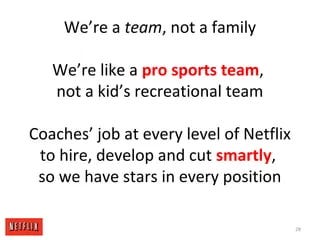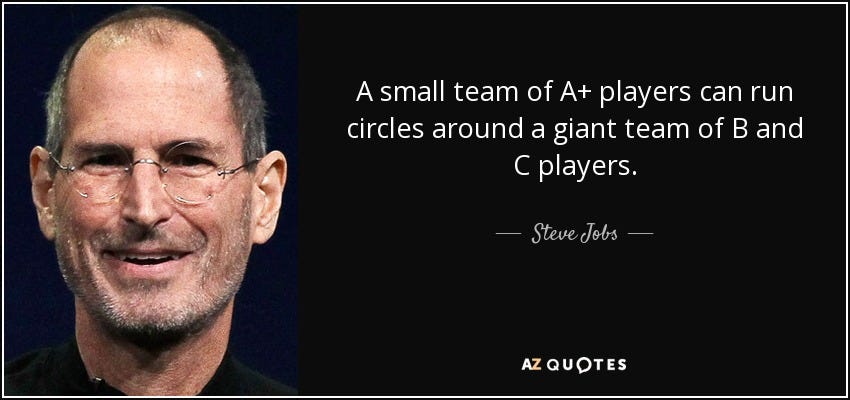A-Players Create Success
A-players create success while B-players participate in success.
People are everything when it comes to building a successful software company, but most leaders don’t know how to hire AND retain the right people.
If a company thinks it’s a family then bad decisions will inevitably be made. Netflix got the right analogy.
High growth companies that want to maximize success are not families. If they act like families then they will not hire the best talent and they will retain the wrong folks. I have seen many companies operate more like a family than a pro sports team and the outcome is always suboptimal.
Ruthlessly recruiting and maintaining the best talent for the current needs of a company is required to maximize success. Families won’t make those types of hard decisions.
Frank Slootman (CEO of Snowflake) on the difference between drivers and passengers:
In dynamic, high growth environments there is a premium on drivers. People who make things happen, who move dials, who stop at literally nothing. True drivers, the types that change history like for example the late Steve Jobs are rare, and usually are found in super high profile situations.
Passengers are an insidious threat to the vibrancy and creative force in an organization. They are the ultimate B players, not seen as bad enough to dismiss, and not good enough to retain. They are often good looking, well credentialed, well-spoken and socially adept. Nothing wrong at face value. They get along famously. But they are not close to the drive train, or where the stuff hits the fan. Task ownership is marginal.
Finding A-Players
The recent OpenAI drama was interesting in many ways, but one I have been thinking about is the importance of finding the right people.
Below is one of the events that played out:
Marc Benioff is the founder of a $200B+ software company and one of the most respected people in the industry. Marc sent out messages on social media that Salesforce will hire any OpenAI employee that was planning on quitting as a result of the drama. He also sent private DMs to some OpenAI folks offering his time to talk to them.
Below are a few lessons from these events and personal experience:
Recruiting A-players never stops
Marc has been at this for more than 20+ years at Salesforce. Salesforce has reached a scale that almost no other company will likely reach. BUT….Marc is still personally recruiting and looking for great talent to make Salesforce even better as their needs change.
How you do anything is how you do everything
This is a popular motivational quote but also applies in recruiting. If there is any red flags in the recruiting process on how a person acts then don’t ignore those red flags because it probably isn’t a one-off.
One bad hire can tank a culture and cause no A-players to join or stay at a company.
The brilliant jerk is almost never worth it
Hiring managers frequently fall for the brilliant jerk - “They are SO smart so we need them despite their flaws”. Huge successful companies are not made by one person (yet…) so hiring a brilliant jerk is going to cause your other A-players to leave and slowly kill the culture at your company.
A-players are usually company and stage/time specific
An A-player at one company might be a B-player at another. Or over time they can turn into a B-player at the same company.
There are a few reasons this usually happens:
A person’s skillset might be specific to a certain company stage. A common example of this is a VP of Sales - a VP of sales at a small, high-growth company is much different than a large established company. So if a company grows then that VP of Sales may no longer be an A-player for the company’s current circumstances.
Importance of domain expertise. In my humble opinion I am really good at enterprise software finance and I am a hard-worker, amazing to be around, etc, so I am clearly an A-player where I am at. BUT…if I joined Rivian as their CFO then I would definitely be a B or a C-player because I have no idea how the car manufacturing world works. While I could eventually learn it, high growth companies typically don’t have the time — particularly true for leaders.
The A-player loses their excitement and motivation. This can happen for a number of reasons:
Company hired too many B and below players, which makes A-players lose excitement
Company’s future prospects deteriorate to a point where the A-players don’t believe in the company any more. This is happening a lot right now given the tough macro environment.
The A-player becomes bored/tired. This can happen for a variety of reasons - burnout from working too hard for too long, decides to find a new job, fear of AI taking over the world, etc…
A-players are not necessarily the smartest people but they work the hardest
The level of smarts needed depends on the role and complexity of the area. If you pay a hardworker as much as the OpenAI folks then they will work incredibly hard and run through walls to make things happen. The problem is if they don’t have the necessary smarts then they may run through the wrong walls.
There is a minimum bar of smarts that is needed to be an A-player but beyond that the incremental value of smarts has diminishing returns. If you can find someone strong in both then fantastic, but if I had to choose then I will always pick the motivated, hard worker that meets the minimum smarts requirement over the relatively smarter person who is less of a hard worker.
Retaining A-Players
A-players attract A-players
The best want to work with the best and if mediocrity creeps in then the A-players will leave and no A-players will join. This will lead to a fast downward spiral for the company.
A-players hire A-players
This is slightly different than the previous point. A-players hire people that are better than them and are not intimated by someone great. A-players also know what other A-players look like.
B-players don’t know what great looks like or they are intimated by A-players so they don’t hire them.
Final Thoughts
If the right people are what make a successful company then the wrong people can destroy one.
All leaders need to be continually making sure they have A-players on their teams and quickly removing everyone else. Recruiting never ends and it is everyone’s job.
A-players create success while B-players participate in success.





This is so prescient given the events of the past week at OpenAI.
Hard not to keep asking yourself which player you are now and have been at different points in your career in the last. I think the important thing is to not be too fatalistic about it. As you say -- you’d be a B or even worse player at Rivian. But you could change that -- by finding a new job better suited to giving you a shot at being an A-player. And/or by changing your mentality and pushing yourself to drive through that wall. Perhaps a good New Year’s resolution to think about.
"If a company thinks it’s a family then bad decisions will inevitably be made."
I sympathize with the "A-player" meme, but the historical record unfortunately does not bear it out. It has to do with skin in the game. I laid it out here, and of course Taleb did it first.
https://albertcory50.substack.com/p/whats-missing-with-american-ceos
The oldest, continuously operating companies in the world are ALL family companies. It's not so much that they never make bad decisions, but they manage to survive. Some of them. Obviously most family-run companies don't survive, but virtually NO "professionally run" company does.